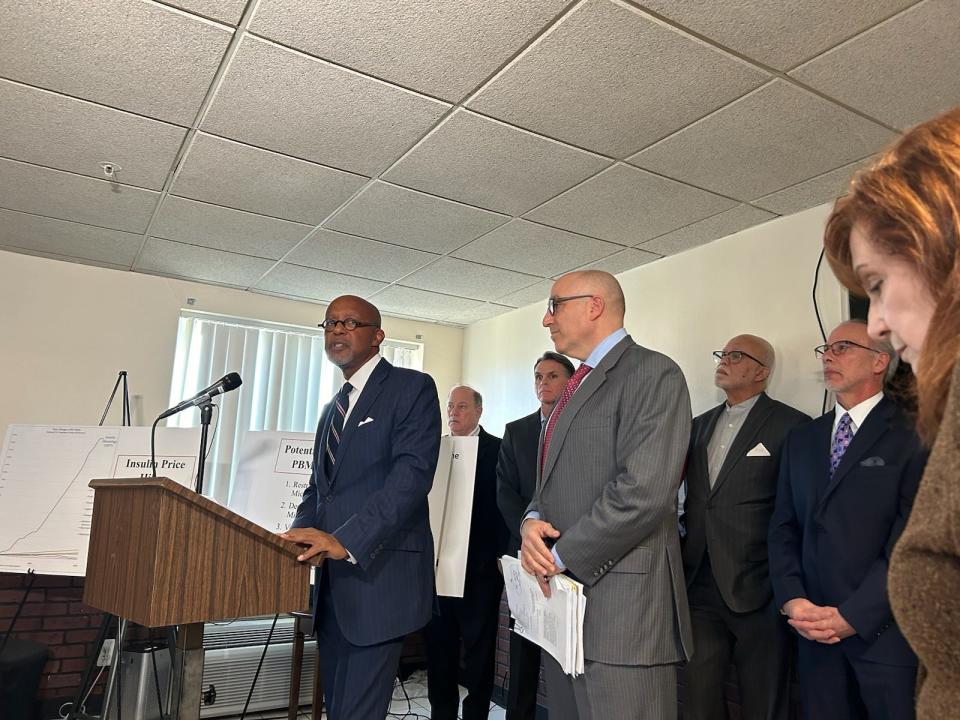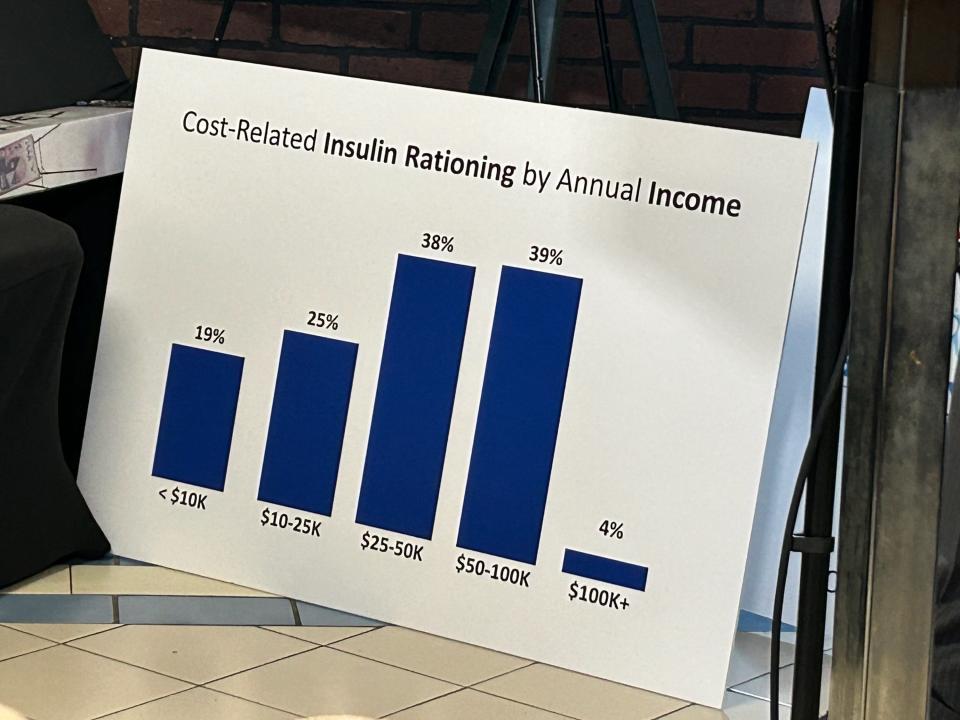4 metro Detroit counties sue pharmaceutical makers to recover insulin costs
- Oops!Something went wrong.Please try again later.
Four metro Detroit counties filed federal lawsuits Wednesday against some of the nation's biggest pharmaceutical manufacturers and pharmacy benefit managers alleging illegal price fixing for insulin products.
Macomb, Monroe, Wayne and Washtenaw counties filed the lawsuits in U.S. District Court in New Jersey against more than a dozen companies, including Lilly, Sanofi Aventis, Novo Nordisk, Express Scripts, Optum Rx and CVS Caremark, per their attorneys.
"These are the first such lawsuits that have been filed in the state of Michigan and probably more to come," said attorney Melvin Butch Hollowell of the Miller Law Firm.
He described the allegations during a news conference, saying that nationally "the pharmacies and manufacturers get together. They control about 90% of the market each, of the insulin market. They talk to each other secretly. And they jack up the prices through anticompetitive means. And what we've seen is over the past 20 years, when we talk about jacking up the prices, they jack them up 1,500% in the last 20 years. 1,500%."
Duggan wants Detroit to examine options
"It has cost millions and millions of dollars out of the coffers of municipalities throughout the state, and we're asking for injunctive relief," he said.
Detroit Mayor Mike Duggan said he supports the litigation and on Wednesday he requested Detroit City Council authorize retaining the law firms "based on this very important issue."
While Medicare recipients older than 65 can get insulin for $35 a month, Duggan said, in Detroit "we have more than one out of six of our residents who are suffering from diabetes today, and if they aren't on Medicare, they're subject to this same gouging."
Nearly 965,000 people in Michigan have been diagnosed with diabetes, and another 239,000 people in the state have diabetes but don't know it, according to the American Diabetes Association.
Some 122,000 Michigan Medicare beneficiaries used insulin in 2020, according to material from the White House in 2022.
Attorney: Amount owned is 'enormous'
Hollowell said the 146-page complaint has allegations under the RICO statute as well as the Sherman Antitrust Act, the Michigan Antitrust Reform Act and the Michigan Consumer Protection Act. He said the lawsuits from the four counties cover about a third of Michigan's residents, about 3.2 million people.

Attorney Mark Bernstein said municipalities are owed "an enormous amount." Though the exact amount is not known, attorneys said, Bernstein said it could be "hundreds of millions of dollars."
"We started in the opioid litigation thinking it was gonna be a significant case and in the aggregate across the country I think the settlement now is in the $27 billion range," he said. "But in the state of Michigan, it's close to a billion dollars. So do we think this is that size? It might be."
Companies respond to the lawsuits
Four companies responded to the lawsuits in emailed statements to the Free Press.
Lilly stated: "These complaints are baseless and should be dismissed, just like cases brought by other local governments have been. It's the local governments filing these lawsuits — not Lilly — who decide the terms of the rebate arrangements they now say are improper, including whether to pass rebates on to people who take insulin.
"Lilly has been working for years to reduce insulin out-of-pocket costs for people with diabetes, against the headwinds of a health care system that incentivizes others — like the parties filing these lawsuits — to choose higher list-price medicines over lower-priced options. Lilly was the first and still only company to cap what people pay at $35 per month for all of our insulins, and the average monthly out-of-pocket cost for Lilly insulin is even lower, $20.48. We also cut insulin prices by 70% and automatically cap monthly out-of-pocket costs at $35 or less wherever possible, which should drive that average even lower."
Novo Nordisk said that it believes the allegations "are without merit, and we intend to vigorously defend against these claims. While we will not comment further about ongoing litigation, we recognize that not all patient situations are the same and we have a number of different insulin affordability offerings available through NovoCare. Importantly, we continually review and revise our offerings as well as work with diverse stakeholders to create solutions for differing patient needs."
Novo Nordisk also stated it has offerings with national pharmacies that provide human insulin for about $25 per vial. Effective Jan. 1 of this year, it stated it lowered the U.S. list prices of several insulin products by up to 75% for people with Type 1 and Type 2 diabetes. It also stated it also reduced the list price of unbranded biologics to be the same or a lower list price of each respective branded insulin.
Last year, per the company, approximately 63,000 patients in the U.S. received free insulin and almost 1.4 million patients used some form of Novo Nordisk assistance when accessing its insulin products. It also stated it has a program in the U.S. where eligible patients at risk of rationing can receive a one-time, free, short-term supply of insulin (up to three vials or two packs of pens).
Sanofi stated: "While we will not comment on the specifics of the allegations, Sanofi's pricing practices have always complied with the law and the company is committed to helping patients access the medicine they need at the lowest possible price.
"Following through on that commitment requires Sanofi to navigate a complex environment. Under the current system, fees and savings negotiated by health insurance companies and PBMs through rebates are not consistently passed through to patients in the form of lower co-pays or coinsurance. As a result, patients' out-of-pocket costs continue to rise while — between 2012 and 2022 — the average net price of our insulins declined by 58%.
Optum Rx stated: "We have long been focused on lowering the net cost of prescription drugs, including insulin. Our clients and consumers count on us to be a counterweight to the substantial market power of manufacturers, which have sole discretion in setting and raising prices for their products. This lawsuit is without merit and we will defend ourselves against these allegations."
What attorneys, municipalities want
Bernstein said plaintiffs demand that the companies "stop their disgraceful price gouging conduct" and that the municipalities "simply want their money back."
He read a sentence from the complaint indicating that in 1922 two people working at the University of Toronto "pioneered a technique for removing insulin from an animal pancreas that could then be used to treat diabetes." He said they obtained a patent, then sold it to the university for $1 explaining that "when the details of the method of preparation are published, anyone would be free to prepare the extract, but no one could secure a profitable monopoly."
But Bernstein said the allegation in the lawsuits "clearly displays the betrayal of this intention."

Wayne County Executive Warren Evans said in Wayne County about 20% of residents are at poverty level, and the county pays "an awful lot of money for drugs, particularly insulin, and in this case for its employees. And we've been gouged, and we know we've been gouged. And that money needs to be recouped. It's only right that we recoup it."
Evans said, "It's just unconscionable." He said people are forgoing insulin, which they critically need for their health, because they can't pay for it.
More: Michigan insurers seek higher premiums amid soaring demand for weight-loss drugs
Macomb County Executive Mark Hackel said one of his county's highest costs is its employees, not just wages, but also benefits. He said health care costs for retiree and active employees for this year's budget cycle is going to be about $64 million.
"Just one drug, just one drug we're talking about — insulin, $1.5 million we attribute to this $64 million cost. That's about 2%," he said.
Hackel said the county also has managed care for inmates at the county jail and youths at the Juvenile Justice Center.
Officials said the money could have been used for hiring law enforcement personnel, improving roads or maintaining parks. While this litigation is about driving down cost, Hackel said, "more importantly ... it's potentially saving lives for people that truly do need this insulin and at a reasonable cost."
Free Press staff writer Kristen Jordan Shamus contributed to this report.
Contact Christina Hall: chall@freepress.com. Follow her on X, formerly Twitter: @challreporter.
Support local journalism. Subscribe to the Free Press.
This article originally appeared on Detroit Free Press: Metro Detroit counties allege price fixing relating to insulin products

